Just for kicks: Africa’s sneaker obsession
We speak to the entrepreneurs designing homegrown African trainers to find out why the shoe’s now on the other foot
One day in 2015, South African accountant Theo Baloyi was organising his impressive collection of over 100 pairs of sneakers when he noticed that something was missing: an African brand. As Baloyi saw it, he had a choice. He could either continue working at PwC, funding his passion for sneakers on the side, or make a mark in the world he loved so much. “If you buy too much of something, then why not own it?” he laughs.
Baloyi left his job to reinvent himself as the founder of Bathu, which has since become one of South Africa’s most successful sneaker brands. It got off to a shaky start, with the light mesh material that the shoe is now famous for being refused 13 times by the factory where they were made. It finally got the go-ahead, and three years later, the first Bathu store opened in Johannesburg. Now a Forbes 30 under 30 businessman, Baloyi runs over 30 stores across the country.
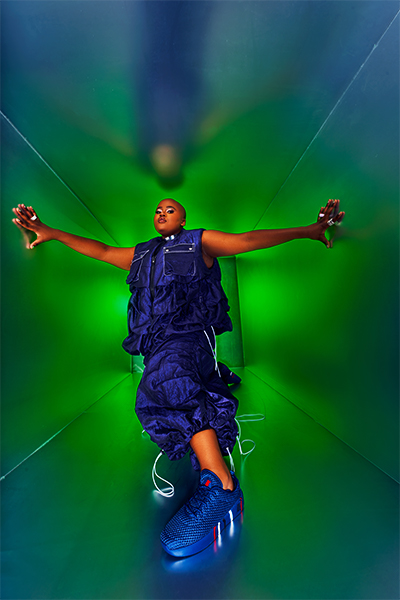
Bathu sneakers in blue
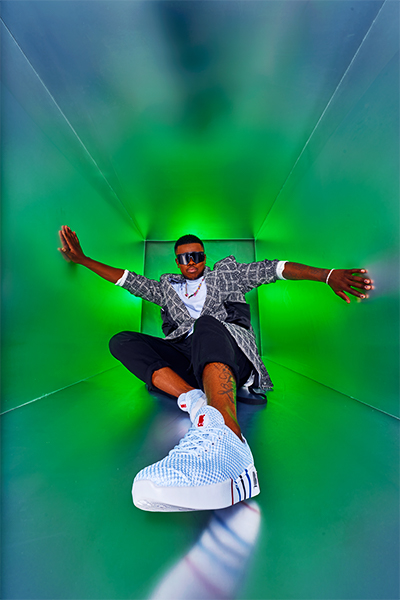
Bathu’s acclaimed mesh design on display
Baloyi is one of a series of entrepreneurs promoting African design in the world of trainers. While the African market is still small in comparison with those in the EU and US, sneaker culture is decidedly taking off there. Nigeria held an inaugural Sneaker Fest in 2020, shoe exchanges regularly take place in Cape Town, and sneaker cons are popping up all over the continent, including in Zimbabwe and Cameroon. Revenue for this year alone is projected to reach €1.8 billion – and global brands want in on it.
Nike launched its first store in West Africa last August, in Lagos’s Ikeja City Mall, and has also just opened a factory store in Circle Mall in Lekki, adding Nigeria to its existing African presence in Kenya and South Africa. Puma is expanding in the region and Adidas launched a new store in Johannesburg in 2021. With uncertainty in developed markets such as the UK, the US and Europe – due to evolving fashion trends, Brexit and the rise of the resale market – many global brands are looking beyond their traditional customer base in search of new growth opportunities.
Baloyi sensed the potential for African sneakers when the rest of the world started taking a greater interest in African music, tech and entertainment. It’s echoed by Milcos Badji, founder of Senegalese brand Nio Far, who notes that the demand for trainers in Africa mirrors a growing global demand for African brands. “What’s funny is that African stores are maybe not putting African brands forward, but Western stores are,” he says.
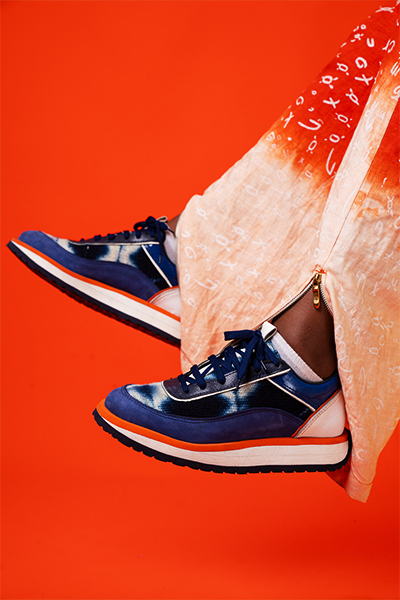
A gleaming pair of Nio Far kicks / Image: Talla Niang
On a continent where international footwear can carry social status – Nike and Adidas were recently listed as two of the top brands that Africa admires – no one is denying the power of these household names. But the sneaker bubble around international brands is starting to burst with the global rise in inflation, leading to consumers being more discriminatory in their spending and opting for homegrown alternatives.
The timing is right, with Baloyi mentioning how South African mall owners are more open to giving space to local brands than they used to be. If Africa’s booming streetwear ecosystem is anything to go by, which includes South Africa’s recently launched StreetCon (co-hosted with Comic Con Africa), Ghana’s Free the Youth label and Nigerian streetwear festivals Homecoming and Street Souk, the conditions are perfect for regional sneaker brands to break into the mainstream.
What sets them apart from Western brands is a desire and innate ability to speak directly to African consumers. While Bathu draws on place names and pop culture to influence its shoe colours – Egoli Gold (Johannesburg Gold), Naledi Yellow (Star Yellow), Wakanda Black – Nio Far’s designs are based on folkloric African stories that are little known by the general public. African proverbs are stitched into the patterns of shoe designs, while shapes on others nod to social status or history – like circles for family and community, or zigzagging triangles to indicate the elbow of the iguana, meaning good fortune.
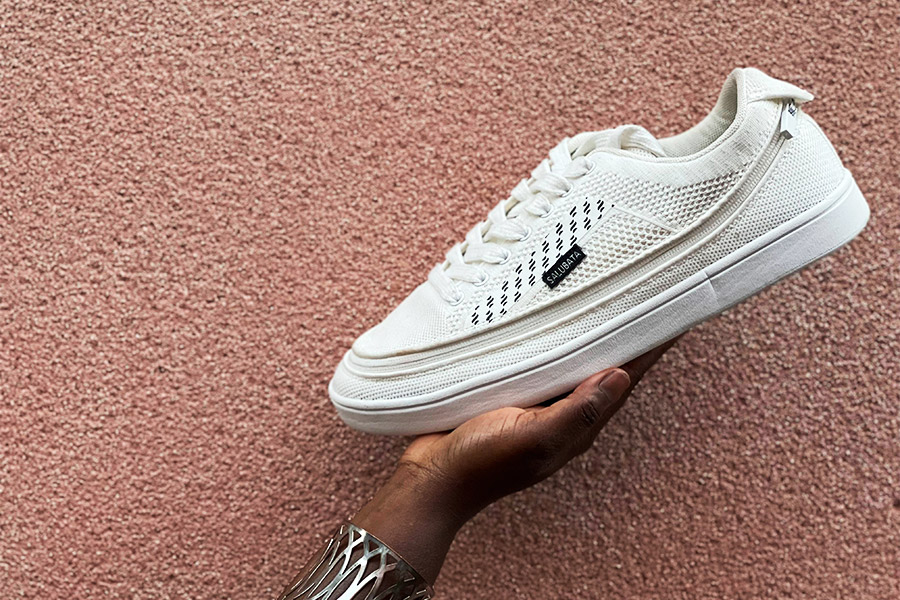
From plastic bottle to super-cool Salubata sneakers

Nio Far’s latest collection is a result of three years’ research with the Dogon tribe in Northern Mali. It aims to convey their deep relationship with the solar system. “I’m really looking into how they used to live in West Africa, and what is our real, true culture,” says Badji.
Nio Far has been spotted on celebrities like Swizz Beatz, Alicia Keys and Forest Whitaker. But despite this success, Badji insists that this brand will remain bespoke (his two Dakar-based workshops currently produce just four pairs per day). With prices starting at €200 a pair, these are fashion statement sneakers – but there are plans in the works for a more mainstream brand. From next year, his kicks will be priced at €70 to €100, thanks to a hybrid design model that involves machines as well as people.
“I don’t make a collection unless I have something to say”
While Nio Far promotes ancient legends of West Africa, a distinctly modern movement is drawing global attention to the region: Afrobeats. Burna Boy and Wizkid both won Grammy awards in 2022 and play to sold-out stadiums. But although sneaker history is intertwined with hip hop culture, this hasn’t extended to African shoe brands. “They should be its biggest ambassadors but personally, I’m not feeling it,” says Badji. Green shoots are starting to grow – Puma’s global ambassador is Nigerian super star Davido, who is behind the most-streamed Afrobeats song of all time – but more opportunity is out there.
“If a brand can’t secure Hollywood-level endorsement, the next best thing is Afropop icons,” says Christopher O.H. Williams a former Nike, Adidas and VF Corp executive. “They are already global – Burna Boy is playing globally, yet he’s also very African. He has currency on the continent and currency in the diaspora.”
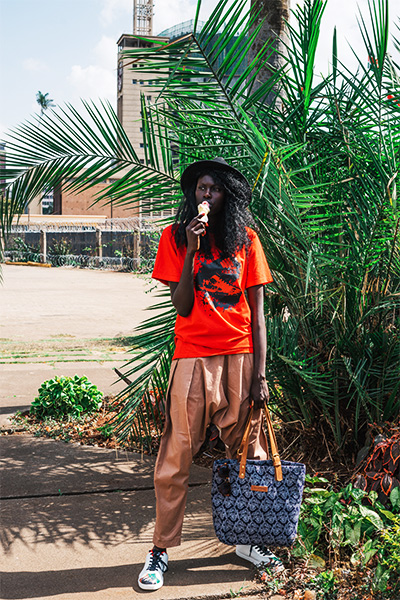
Keexs sneakers looking as eye-catching as ever / Image: Brian Siambi
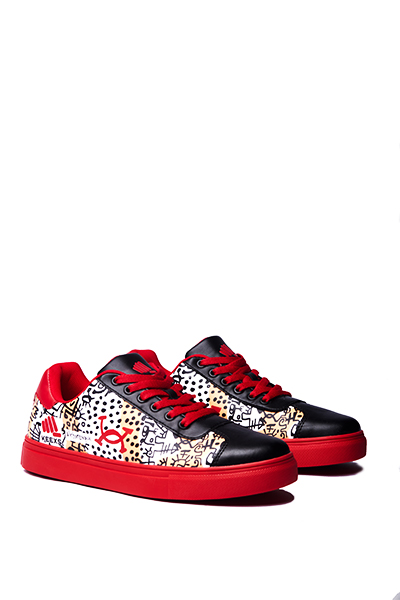
Up close and personal with a pair of Keexs
As the former chair of the board of directors for Kenyan sneaker brand Enda, Williams knows his stuff. Enda – which means ‘go’ in Swahili – was the first African high-performance footwear brand to give the international companies a run for their money. All its shoes are designed to maximise the runner’s natural footprint, in line with the Kenyan running style and backed up by the country’s history of producing record-smashing, long-distance runners.
Founded by Navalayo Osembo in 2016, the company raised almost €1 million in start-up funding and is the first athletics company from Eastern Africa to secure seed funding for expansion. Despite this, as well as an endorsement from actress Lupita Nyong’o, the company is not immune from challenges.
“It’s not a western playbook. [Brands have] got to really lean into the African market, its constraints and opportunities, its assets,” says Williams. African designers might not always have the retail and marketing budget of more global names, but that can allow them to get creative. Last year, Fila collaborated with the popular South African brand Drip footwear on a co-designed capsule collection, while South African illustrator Karabo Poppy Moletsane has designed three sold-out Air Force 1’s for Nike (LeBron James owns a pair). Stitched on ochre-coloured leather, her hairstyle-inspired illustrations feature nuggets of a zigzag that represents cornrows.
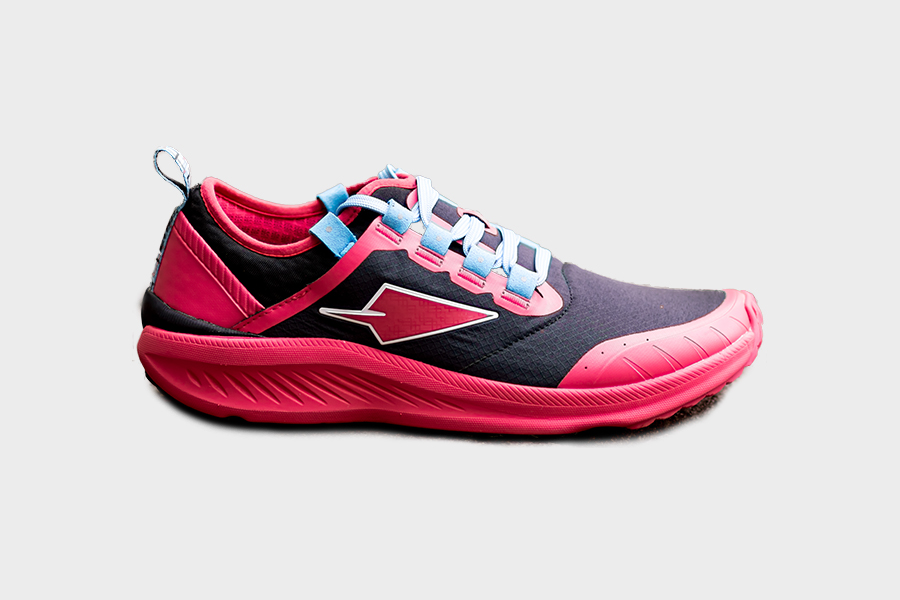
Just looking at these makes you run faster: Enda's Koobi Fora trail run shoes

Innovation is everywhere. Nigerian start-up Salubata, for example, makes customisable plimsoll shoes from recycled plastic bottles. The sleek, block-colour uppers are completely detachable and wouldn’t look out of place in Copenhagen, Berlin or Brooklyn. The bold approach has paid off: Salubata was selected to join the Los Angeles Techstars Accelerators programme and has signed partnerships with Faire and Amazon.
What all these brands have in common, aside from a desire to tell Africa’s story, is a need to give back to their local community. Nigerian brand KEEXS runs a partnership with Slum2School Africa, helping to keep kids in school. Nio Far donates to a maternity hospital, and Bathu partners with Nickelodeon to give shoes to children.
“I don’t make a collection unless I have something to say,” confirms Badji. Whether these designers are preserving the African aesthetic or recycling plastic waste, world-leading sneaker brands should sit up and take note. They might just learn something about the future.
Discover more African style innovations with our guide to Ethiopia’s most influential fashion designers.